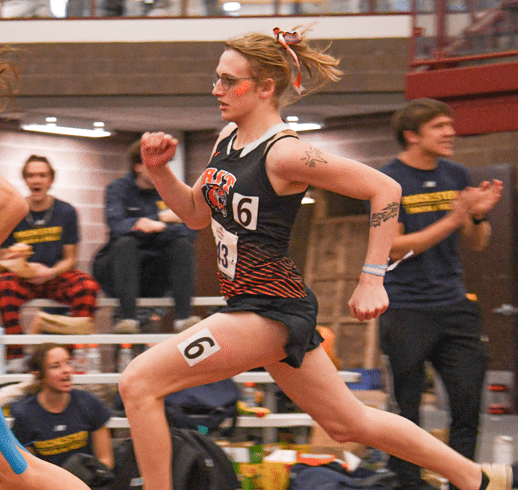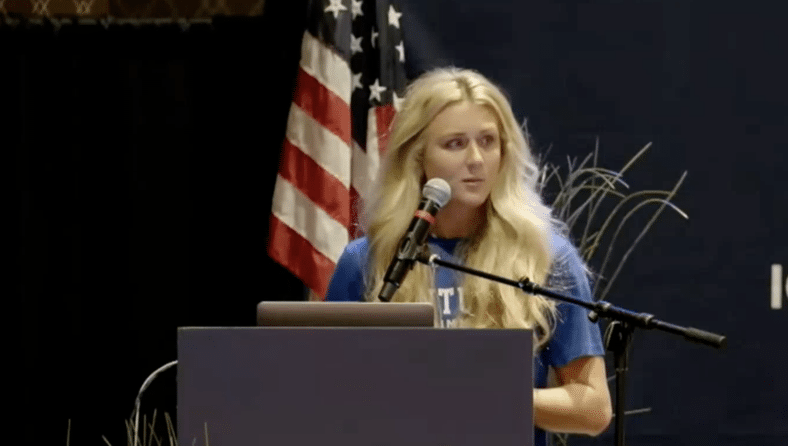It’s been two years since Lia Thomas made history, or infamy, depending on your point of view.
Last Friday, a group of 16 former and current student-athletes decided to file a lawsuit against the NCAA. The suit calls for a total ban on transgender women in all sports, citing opportunities “lost” and “taken” and how trans women “displaced” cis women “unfairly.”
It also calls for a plank close to the heart of one of the suit’s leaders, former University of Kentucky swimming All-American and anti-trans activist Riley Gaines.
The plank requires “the NCAA to render invalid and reassign and revise all awards, records, points, prizes, titles, trophies announcements or other recognition assigned, given announced, communicate or recognized by the NCAA which were based in any way upon the competitive results or participation of any male who competed in women’s events.”
Get off the sidelines and into the game
Our weekly playbook is packed with everything from locker room chatter to pressing LGBTQ sports issues.
This plank, and the lawsuit, comes partially from when Thomas and Gaines competed against each other in the NCAA championships two years ago.
Gaines tied with Thomas for fifth place in the 200-yard freestyle. Gaines’ response to having to wait a few weeks to get her trophy, because the NCAA only carried one trophy per place on site, is to also use this lawsuit to gain a personal pound of flesh.
Never mind the personal attacks against Thomas she levies in every speech, a mouthpiece for the conservative anti-trans lobbies powering this lawsuit.
True to form, this suit is built on the anti-trans hysteria that said that Thomas, or 2019 NCAA Division II 400-meter hurdle champion CeCé Telfer, were people rising to destroy women’s sports.

We’ve seen this hysteria flare up recently. Consider the consistent disrespect and transphobia coming from the main sponsor of the lawsuit, the Independent Council on Women’s Sports.
On their social media posts over the last couple of weeks, they’ve willfully demeaned three successful high school trans girls, and collegiate track athlete Sadie Schreiner of NCAA Division III Rochester Institute of Technology (N.Y.) who was competing at NCAA DIII nationals at 200 meters.
All these student-athletes were referred to as “men” and “cheaters,” even though each was fully eligible to compete by the regulations of the respective governing bodies of their event.
The suit doesn’t surprise Ursinus College professor, sports historian and host of the End of Sports podcast Johanna Mellis.
A former Division I conference champion swimmer at the College of Charleston, Mellis denounced the lawsuit to Outsports as “a political project from start to finish that does the opposite of what it and its plaintiffs claim that it does.”

She also noted that of the 16 student-athletes who are part of the lawsuit, 12 of them are from swimming.
In an op-ed published by The Guardian last year, Mellis was highly critical of her sport’s role in the heightened transphobia of the moment while also recounting her own career and the issue she says the lawsuit plaintiffs aren’t discussing.
“They claim that they are protecting women’s rights in sport,” Mellis said. “Yet nowhere in the inaccurate lawsuit — or in any of their advocacy work — are they critiquing the people in sport who overwhelmingly discriminate against women and other minoritized groups physically, psychologically, emotionally, sexually and financially: the largely cisgender, heterosexual, white men in charge of opportunities in the NCAA, athletic departments and the International Olympic Committee.
“I continue to be disgusted that cishet white women in my community are trying to harm trans women so desperately. Trans female athletes never harmed nor sexually harassed me in the pool or locker room. It was always cishet white men.”
This issue does not exist in a vacuum. The groups pushing this suit and this hysteria have used sport in general, and Thomas, in particular, to push anti-trans discrimination laws that now affect more than 30 U.S. states. The recent combination of anti-trans law passed in Ohio in January is a textbook example.
It’s upsetting when I think of the high school kids some of these types demean to the glee of their followers. I’m sure some of these people are parents as well. How would they feel if someone was coming at their child with venom?
I’m still upset at how the NXXT Women’s Golf Pro disqualified Hailey Davidson in the middle of a tour season, partially on the results of a poll of tour players instead of real-world competition data.
I consider her dismissal a slap in the face to a person who has done everything she was mandated to do, while also putting in the hard work to reach a goal. It’s frustrating, and this lawsuit is the latest indignity in a long string of them for trans people who just want to shut up and play ball.
The focus for the suit now shifts to how the NCAA responds. The organization’s president, Charlie Baker, the former Republican governor of Massachusetts who supported and signed trans rights legislation five years ago, has been publicly noncommittal on the NCAA’s phased transgender policy.
That’s a policy that will undergo significant change this coming fall when the NCAA cedes to the eligibility requirements of national and world governing bodies in each sport. In swimming and track and field, for example, transgender women are banned from the women’s competition.
Some will have reason to doubt if the NCAA will stand up and affirm its upcoming regulations or consider a complete ban in NCAA sports regardless of what the individual sports governing bodies decide.
“The lawsuit still provides cover for the NCAA’s misogyny and, of course, transphobia,” Mellis said. “The NCAA can and likely will proclaim that it is trying to ‘defend women’s sports,’ and very well may cede ground to the plaintiffs’ cause and entrench the anti-trans discrimination.”
I share those doubts as well. Looking at how the NCAA did not protect or support Thomas against the vitriol received, I am reminded of a quote from James Baldwin: “I can’t believe what you say because I know what you do.”
This lawsuit was filed by groups with political axes to grind. In Gaines, they found someone to sell their hysteria. She made the issue personal and has acted petty towards Thomas in every regard since they hit the touch pads at the same time two years ago.
Thomas is in law school now and probably hasn’t thought much about the turmoil of the past, yet she still lives rent-free in the heads of Gaines and the people backing this lawsuit.
A question for those who constantly shriek for “fairness”: Is it fair to Lia Thomas that she is still your target?
